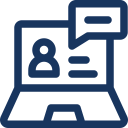SCTP - IT Business Analyst
- Home
- SkillsFuture Career Transition Programme (SCTP)
- SCTP - IT Business Analyst
IT Business Analyst

Participants will learn about business analysis methodologies, requirements gathering, process modeling, project management, as well as gain an understanding of the technical aspects of IT systems such as Software Development Lifecycle.
In addition to technical skills, an IT Business Analyst program also focuses on developing soft skills such as communication, leadership, and problem-solving. Participants learn how to effectively communicate with stakeholders, manage conflicts, and lead teams through complex IT projects.
Upon completion of an IT Business Analyst program, participants are equipped with the skills and knowledge required to analyze complex IT systems and processes, manage projects, and effectively communicate with stakeholders. This prepares them for a career in IT business analysis, which is a high-demand field with a growing number of job opportunities in various industries such as finance, healthcare, retail, and more.
What do IT Business Analysts do?
IT Business Analysts are professionals who bridge the gap between IT and business teams, ensuring that technology solutions meet organizational needs. They gather and document business requirements, analyze information, and communicate effectively with both business and IT teams.
Responsibilities
- Conducting requirements gathering sessions
- Creating clear documentation
- Designing and recommending technology solutions
- Facilitating stakeholder communication
- Participating in project management
- Testing and validating solutions
- Providing implementation support
- Assisting with training and change management and continuously improving implemented solutions
- Plays a crucial role in aligning technology with business objectives, enhancing efficiency, productivity, and overall business performance
Average salary

$5,155.00
per month1 for IT Business Analyst*
*Payscale
Skills Required for this Role
|
Technical Skills & Competencies |
Generic Skills & Competencies |
|
|
Career Support
Career Agility Hub
Enjoy access to NTUC LHUB’s Career Agility Hub (CAH) throughout the SCTP programme. This recruitment platform offers over 100,000 jobs across sectors and levels, along with updates on job fairs and industry events.
Continued Career Support
Tap on career coaching and placement support services provided by NTUC LHUB and its network of partners. Additionally, enjoy continued access to CAH and receive announcements of curated jobs and job fairs via email.
- Singapore Citizens, Singapore permanent residents, and holders of Long-term visit pass plus (“LTVP+ Holders”) who are aged 21 years old and above
- Committed to complete the programme
- At least 21 years old and above
- Minimum NITEC
- Be able to speak, listen, read, and write English at a proficiency level equivalent to the Employability Skills Workforce Skills Qualification (ES WSQ) Workplace Literacy (WPL) Level 6
- Be able to manipulate numbers at a proficiency level equivalent to ES WSQ Workplace Numeracy (WPN) Level 6
- Well versed in all Microsoft Office applications, especially Excel, Word, PowerPoint, and Outlook
- Strong communication skills and problem-solving skills
- Ability to multitask
- Ability to work in a team environment
- Maintains high integrity and displays reliability
- Ability to foster strong relationships with stakeholders, communicate effectively and build trust in order to influence, facilitate and resolve conflicts
- Committed to complete the programme
- Interested participants should apply for the programme
- Shortlisted candidates will be called for a 15-minute face-to-face or virtual interview
Training methodology

Instructor-led Virtual Training
Lecture and activity-based training with certified Trainers

Online Learning
Self-paced learning via e-learning platforms

Portfolio Building
Create a winning portfolio filled with hands-on projects that will help you shine in interviews.

Mentorship
Your mentor is your partner-in-Project Management. They are instructors and industry practitioners dedicated to your future success.
Duration & learners schedule

Total duration: 2 months (full-time) / 4 months (part-time)
List of Courses to Attend
- Understanding the role and responsibilities of a business analyst
- Learning the fundamentals of business analysis techniques and methodologies
- Developing skills to gather, document and analyze business requirements
- Understanding the importance of effective communication and stakeholder management in business analysis
- Understanding the relationship between business analysis and project management
- Business Process Re-Engineering and Improvements
- Understanding the principles of business process re-engineering (BPR) and process improvement
- Developing skills to identify and analyze inefficiencies in business processes
- Learning how to apply BPR techniques to optimize business processes
- Requirements Gathering
- Developing skills to identify, elicit and document business requirements
- Learning how to conduct stakeholder analysis and manage stakeholders
- Understanding the importance of requirement traceability and management
- Learning how to prioritize and validate requirements
- Understanding the impact of changing requirements on project scope and timelines
- Developing skills to write Transact-SQL queries to retrieve and manipulate data from SQL Server databases
- Learning how to use advanced SQL Server features such as stored procedures, functions, and views
- Understanding the importance of data normalization and indexing in database design
- Gain a comprehensive understanding of the Scrum framework and its principles
- Learn how to apply Scrum practices to software development projects
- Develop skills in facilitating Scrum events, such as Sprint Planning, Sprint Review, and Sprint Retrospective
- Learn to manage stakeholders, risks, and change in a Scrum environment
- Enhance your ability to lead and facilitate Agile teams
- Gain a comprehensive understanding of Excel and its features
- Learn how to use Excel to perform data analysis tasks, such as sorting, filtering, and pivot tables
- Develop skills in creating charts, graphs, and dashboards to visualize data
- Learn how to use Excel functions, such as SUMIF, VLOOKUP, and INDEX/MATCH
- Enhance your ability to work with large data sets and perform data analysis tasks
- Perform Power BI desktop data transformation
- Describe Power BI desktop modelling
- Create a Power BI desktop visualization
- Implement the Power BI service
- Describe how to connect to Excel data
- Describe how to collaborate with Power BI data
- Connect directly to data stores
- Describe the Power BI developer API
- Describe the Power BI Mobile app
- Applying the knowledge and skills gained from previous business analysis courses to a real-world project
- Developing a comprehensive business analysis plan for a specific project
- Learning how to manage project scope, timelines, and budget
- Understanding the importance of stakeholder management and effective communication in project management
- Learning how to measure and report on project success and return on investment
- LO1: Introduction to Data Analytical tools and techniques
- LO2: Recognize Pattern
- LO3: Develop Insight
- LO4: Create Story
Certifications



|
Course Fee and Government Subsidies |
||
|
|
Before GST |
After GST* |
|
Full Course Fee |
$13,930.00 |
$15,183.70 |
|
Singapore Citizens and Singapore Permanent Residents aged 21 years and above 1 (70% funding) |
$4,179.00 |
$4,555.11 |
|
Singapore Citizens aged 40 years and above 2 (after 90% funding) |
$1,393.00 |
$1,769.11 |
|
Singapore Citizens eligible for Additional Funding Support 3 (after 95% funding) |
$696.50 |
$1,072.61 |
*GST payable for all funding-eligible applicants: $376.11 (As per SSG’s policy, the GST payable is calculated based on prevailing rates of 9% after the baseline funding subsidy of 70%).
- Base Subsidy - Eligible Singapore Citizens and PRs aged 21 years and above can enjoy subsidies up to 70% of the course fee.
- Mid-career Enhanced Subsidy (MCES) – Eligible Singapore Citizens aged 40 and above can enjoy subsidies up to 90% of the course fee.
-
Additional Funding Support (AFS)- Eligible Singapore Citizens that meet at least one of the following eligibility criteria can enjoy subsidies up to 95% of the course fee:
- Long-term unemployed individuals (unemployed for six months or more); or
- Individuals in need of financial assistance – ComCare Short-to-Medium Term Assistance (SMTA) recipients or workfare Income Supplement (WIS) recipients; or
- Persons with Disabilities
Funding Eligibility Criteria
- Trainee must be a Singapore Citizen, Singapore Permanent Resident, or LTVP+ Holder aged 21 years old and above
- From 1 October 2023, attendance-taking for SkillsFuture Singapore's (SSG) funded courses must be done digitally via the Singpass App. This applies to both physical and synchronous e-learning courses.
- Trainee must achieve at least 75% attendance for each module
- Trainee must pass all prescribed tests / assessments and attain 100% competency.
- NTUC LearningHub reserves the right to claw back the funded amount from trainee if he/she did not meet the eligibility criteria.

